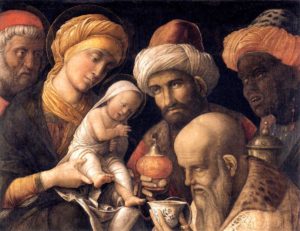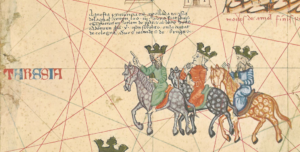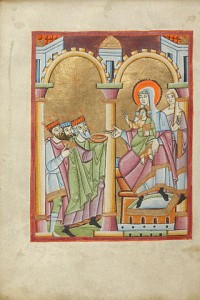Thoughts on the Lessons for The Epiphany (Jan. 6, 2020)
(The readings may be moved to Sunday.)
First Reading: Isaiah 60:1-6
On Sunday, the Twelfth Day of Christmas this year, we turn toward Epiphany, the liturgical season in which we celebrate the revelation of Jesus as God Incarnate.

Adoration of the Magi (c.1495-c.1505), distemper (water-based paint) on linen by Andrea Mantegna (1431-1506). The Getty Center, Los Angeles. (Click image to enlarge.)
We begin with the coming of the Magi, then through the next seven Sundays of this season we will recall other events that manifest the divinity of Jesus. In Sunday’s first reading, the Prophet Isaiah calls out a message of hope to Israel as its people return home from exile. God’s light dawns like a new day as a virtual blanket of camels bearing gifts of gold and frankincense covers the nation’s earth. Rulers from surrounding kingdoms trek toward Jerusalem with bounty, an image that we see reflected when Matthew’s Gospel tells us of the Magi bringing gifts to the Christ child.
Psalm: Psalm 72:1-7,10-14
Echoing the theme of the Isaiah reading, Sunday’s Psalm celebrates Israel’s time of glory with the images of kings of all nations bearing gifts. With God’s blessing, the Psalmist exults, Israel’s king earns the service of all nations. But with this glory comes the king’s overarching duty to be righteous and just to all the people. The king “delivers the needy when they call, the poor and those who have no helper.” The king “shall defend the needy among the people; he shall rescue the poor and crush the oppressor.”
Second Reading: Ephesians 3:1-12
Modern biblical scholarship assumes that the letter to the people of Ephesus in Asia Minor was actually written in Paul’s name by a later follower. This kind of nuance matters as scholars seek to understand the evolution of Christian theology during the first decades after the crucifixion and the resurrection. These verses, in any case, are certainly consistent with one of Paul’s major themes as the young church reached out to Gentiles from its Jewish roots: God’s chosen people comprise all humankind; we are all included in Christ’s body on earth and called to make God’s wisdom known.
Gospel: Matthew 2:1-12
Matthew tells the fascinating tale of astrologers (“Magi,” meaning “magicians,” in the original Greek) summoned to the infant Messiah by a shining star. Matthew, the only evangelist to tell of the wise men’s visit, does not record that they were kings, or that there were three of them, or even that they rode camels; all that comes from tradition but not the Gospel. We do hear that they came to pay homage to “the child who has been born king of the Jews.” They offered gifts of gold, frankincense, and myrrh, echoing the prophet Micah’s words about similar gifts for Israel’s King. They knelt and paid homage to the child Jesus as if he were a king. And then, realizing that evil King Herod’s wanted to kill the child, they avoided Herod by returning home on another road.


